Hi there, I'm Thiemo.

I am a Full Research Professor for Information Systems and head of the Human-Centered AI Systems (HAIS) Lab at the Institute of Digital Technology Management at Bern University of Applied Sciences in Bern, Switzerland. More information about HAIS Lab at our lab website.
My research lies in the general area of Information Systems and Human-Computer Interaction with influences from Natural Language Processing and Machine Learning. I strive to understand how humans perceive, interact, collaborate, and learn with intelligent tools. Based on these insights, I build adaptive user interfaces that go beyond static and rule-based interaction to advance the capabilities when working and learning in the digital world.
Specifically, I am driven by the vast opportunities to enhance and improve organizational processes, human work, or pedagogical scenarios based on recent advances in Natural Language Processing and Machine Learning to enable humans to work and learn self-reliantly and independently of an educator or their background. To do so, I use techniques from Artificial Intelligence (AI) to build AI-powered education tools. My research follows three connected main lines of work: 1) create and study conversational agents or intelligent writing support systems to improve human work or educational scenarios, 2) explore methods and techniques to model human skills to adopt and enrich work or learning processes (e.g., reading, writing or others) and 3) build computational approaches that control when, where and how to provide humans with intelligent support, feedback or tutoring. My work is funded by the Swiss National Science Foundation, the European Commission, and the Swiss Innovation Agency, and I have led interdisciplinary projects that integrate cutting-edge AI methods into real-world applications, e.g., with several AI startups in Bern.
As part of a research team, I have developed adaptive argumentation writing support systems that helps individuals to develop better writing and reasoning skills (Link to CHI 2020 or ACL 2022 paper). Also, I built an intelligent conversational agent that provides students with adaptive and individual argumentation tutoring while writing persuasive essays independent of an instructor, time, or location (Link to CHI 2021 paper). Moreover, I designed an empathy writing support tool by modeling the cognitive and emotional empathy structures in student-written texts (Link to ACL 2021 or CHI 2022 paper).
I believe in the power of collaboration for building better AI-based systems. If you are interested in my work, please contact me via LinkedIn.
 |
My research is funded by local, national, and international private and governmental research agencies.
Selected Publications
Here you find an overview of my publications at Google Scholar and my academic profile at ReserachGate.
- Wettstein, L., Neshaei, S. P., Rietsche, R. & Wambsganss, T. (2026). Adaptive Tutoring Modalities for Supporting Learners’ Reflective Writing Practices. In Proceedings of the 2026 CHI Conference on Human Factors in Computing Systems.
- Wambsganss, T., Janson, A., Söllner, M., Koedinger, K. & Leimeister, J. M. (2025). Improving Students’ Argumentation Skills Using Dynamic Machine-Learning–Based Modeling. In Information Systems Research 0(0).
- Lee, M., Gero, K. I., Chung, J. J. Y., Shum, S. B., Raheja, V., Shen, H., Venugopalan, S., Wambsganss, T., Zhou, D., Alghamdi, E. A., August, T., Bhat, A., Choksi, M. Z., Dutta, S., Guo, J. L. C., Hoque, M. N., Kim, Y., Knight, S., Neshaei, S. P., Shibani, A., Shrivastava, D., Shroff, L., Sergeyuk, A., Stark, J., Sterman, S., Wang, S., Bosselut, A., Buschek, D., Chang, J. C., Chen, S., Kreminski, M., Park, J., Pea, R., Rho, E. H. R., Shen, Z., & Siangliulue, P. (2024). A Design Space for Intelligent and Interactive Writing Assistants. In 2024 CHI Conference on Human Factors in Computing Systems
- Weber, F., Wambsganss, T., Neshaei, P., Söllner, M. (2024). LegalWriter: An Intelligent Writing Support System for Structured and Persuasive Legal Case Writing for Novice Law Students (2024): A Design Space for Intelligent and Interactive Writing Assistants. In 2024 CHI Conference on Human Factors in Computing Systems
- Göldi, A., Wambsganss, T., Neshaei, P., Rietsche, E. (2024): Intelligent Support Engages Writers Through Relevant Cognitive Processes. In 2024 CHI Conference on Human Factors in Computing Systems
- Wambsganss, T., Xiaotian, S., Swamy, V., Neshaei, P., Rietsche, R., Käser, T. (2023). Unraveling Downstream Gender Bias from Large Language Models: A Study on AI Educational Writing Assistance. Conference on Empirical Methods in Natural Language Processing (EMNLP). Singapore. PDF
- Wambsganss, T., Janson, A., & Leimeister, J. M. (2022): Enhancing Argumentative Writing With Automated Feedback and Social Comparison Nudging. Computers & Education, Volume 191, 2022, Article 104644. PDF
- Wambsganss, T., Niklaus, C., Söllner, M., Handschuh, S., & Leimeister, J. M. (2021): Supporting Cognitive and Emotional Empathic Writing of Students. In The Joint Conference of the 59th Annual Meeting of the Association for Computational Linguistics and the 11th International Joint Conference on Natural Language Processing (ACL-IJCNLP 2021) . PDF
- Wambsganss, T.; Küng, T.; Matthias, S. & Leimeister, J. M. (2021): ArgueTutor: An Adaptive Dialog-Based Learning System for Argumentation Skills In Proceedings of the 2021 CHI Conference on Human Factors in Computing Systems PDF
- Wambsganss, T., Niklaus, C., Cetto, M., Söllner, M., Handschuh, S., & Leimeister, J. M. (2020). AL: An adaptive learning support system for argumentation skills. In Proceedings of the 2020 CHI Conference on Human Factors in Computing Systems (pp. 1-14). PDF
Academic Journey
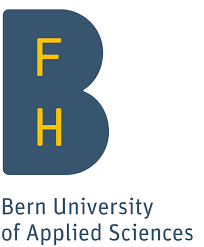 |
 |
 |
 |
 |
- 2026 - today: Full Research Professor for Digital Technology Management and head of the "Human-Centered AI Learning Systems" (HAIS) lab at Bern University of Applied Sciences in Bern, CH.
- 2023 - 2026: Tenure-Track Assistant Research Professor for Digital Technology Management and head of the "Human-Centered AI Learning Systems" (HAIS) lab at Bern University of Applied Sciences in Bern, CH.
- 2024 - 2026: President, ACM SwissCHI – Swiss ACM SIGCHI chapter for Human-Computer Interaction. Bern, CH.
- 2024 - 2026: Subcommittee Chair ACM Conference on Human Factors in Computing Systems (CHI) 2025 & 2026 for "Learning, Education and Families"
- 2022 - 2023: PostDoc and project group lead at the Machine Learning for Education Laboratory (ML4ED) at the École Polytechnique Fédérale de Lausanne (EPFL), Lausanne, CH
- 2022 - 2022: Research Visitor at the Natural Language and Information Processing (NLIP) research group, University of Cambridge, Cambridge, UK
- 2021 - 2022: Visiting Research Collaborator at the Human-Computer Interaction Institute (HCII), Carnegie Mellon University (CMU), Pittsburgh, USA
- 2018 - 2022: PhD. Student and Research Associate at the Institute of Information Management, University of St. Gallen (HSG), CH
- 2016 - 2018: Master of Science (M.Sc.) in Industrial Engineering, Karlsruhe Institute of Technology (KIT), GER
- 2017: ME310 Design Thinking Class as part of the Sugar network with Stanford University, USA
- 2015: Bachelor thesis within a scientific exchange at the Software Institute at the Beijing Institute of Technology (BIT), Beijing, CHN
- 2012-2016: Bachelor of Science (B.Sc.) in Industrial Engineering, Karlsruhe Institute of Technology (KIT), GER
Natively Developed Prototypes
I have designed, developed and scientifically evaluated various prototypes based on different technologies such as Flask, TensorFlow, FastText, PyTorch, Keras, SpaCy or Scikit-Learn.
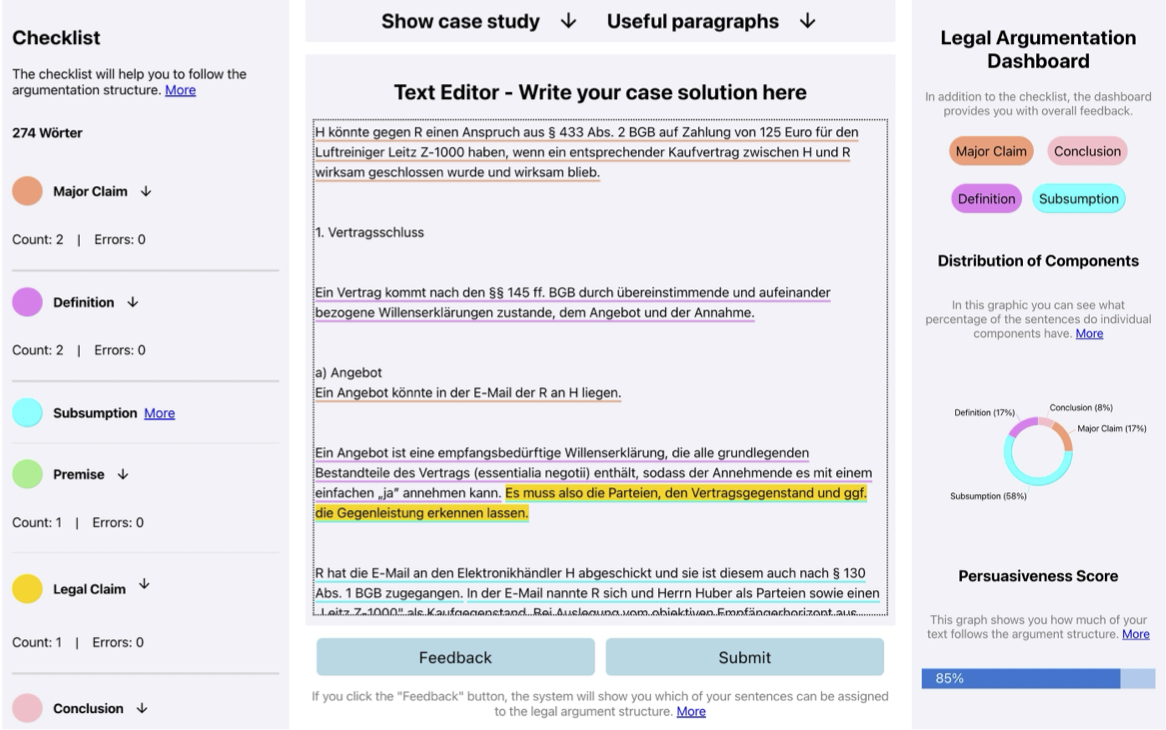 |
LegalWriter an intelligent writing support tool for legal writing (Info) |
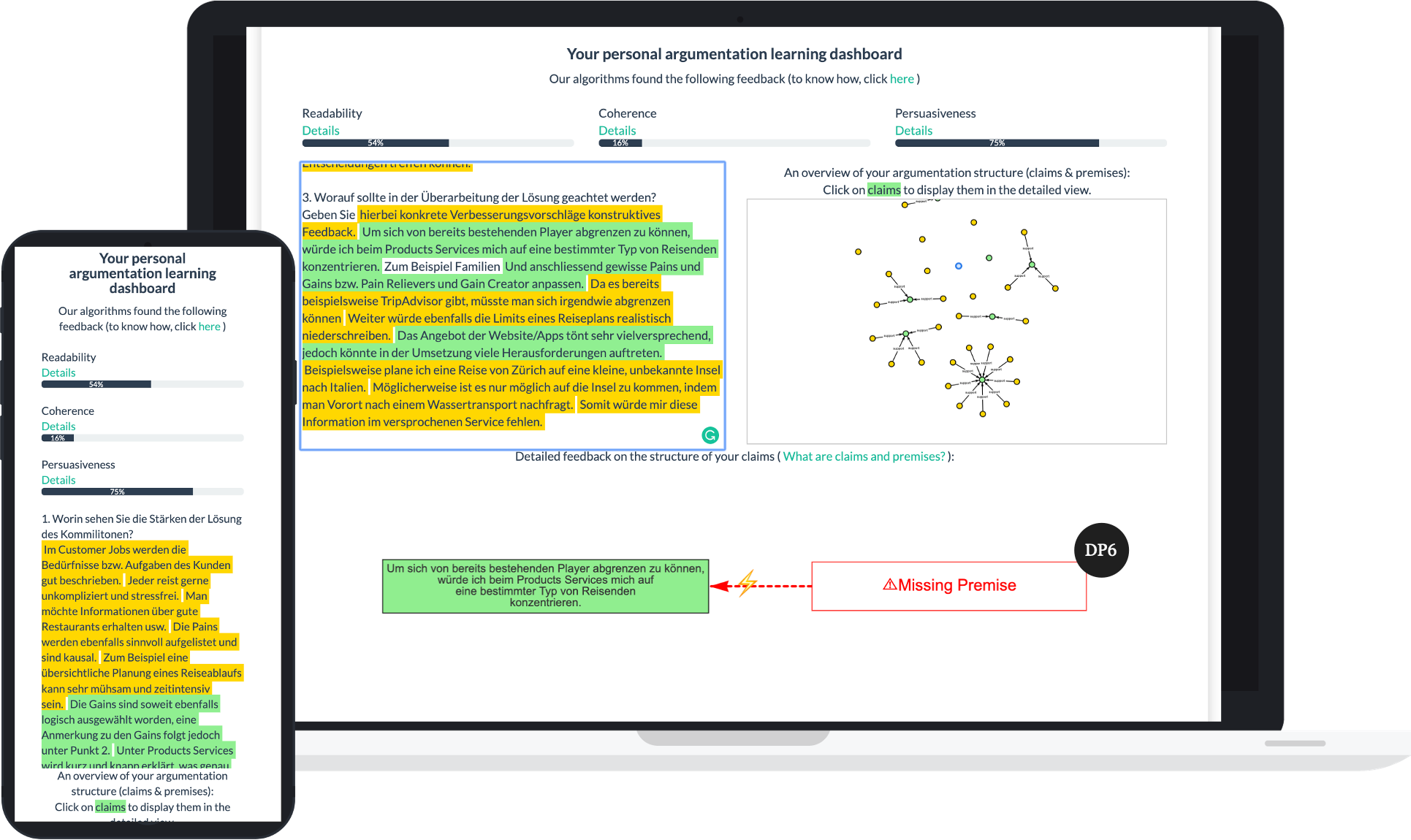 |
ArgueLearn an adaptive argumentation writing support tool based on artificial intelligence (Info) |
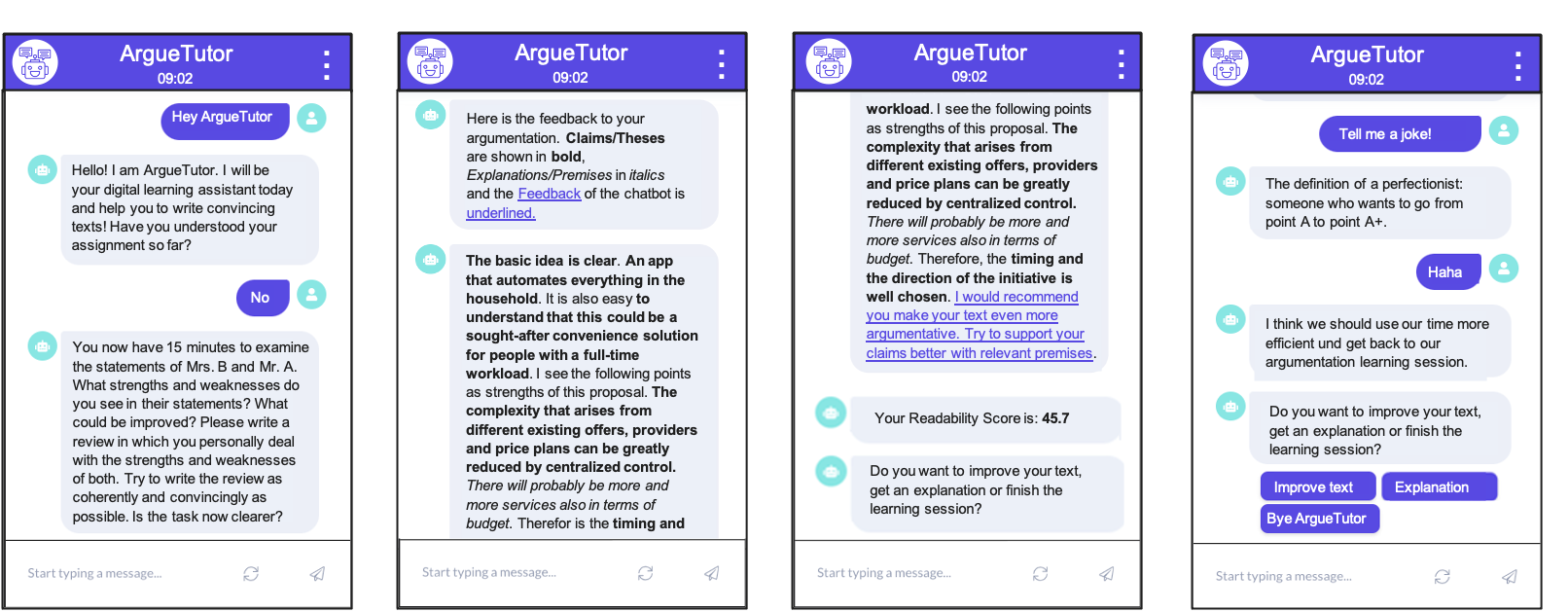 |
ArgueTutor a chatbot for individual argumentation tutoring (Info) |
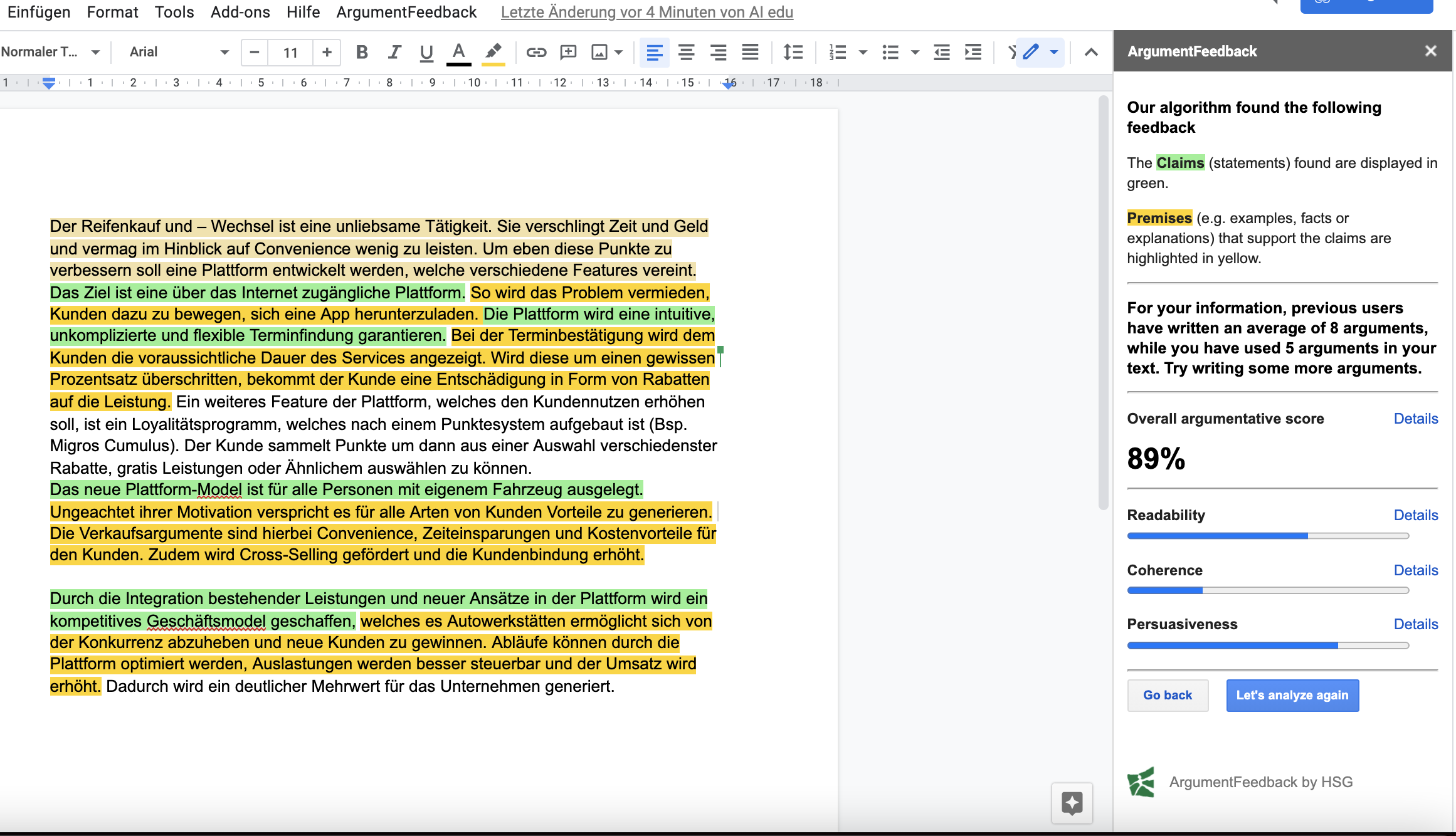 |
ArgumentFeedback a Google Docs Add-on for argumentative writing support on business or project pitches (Info) |
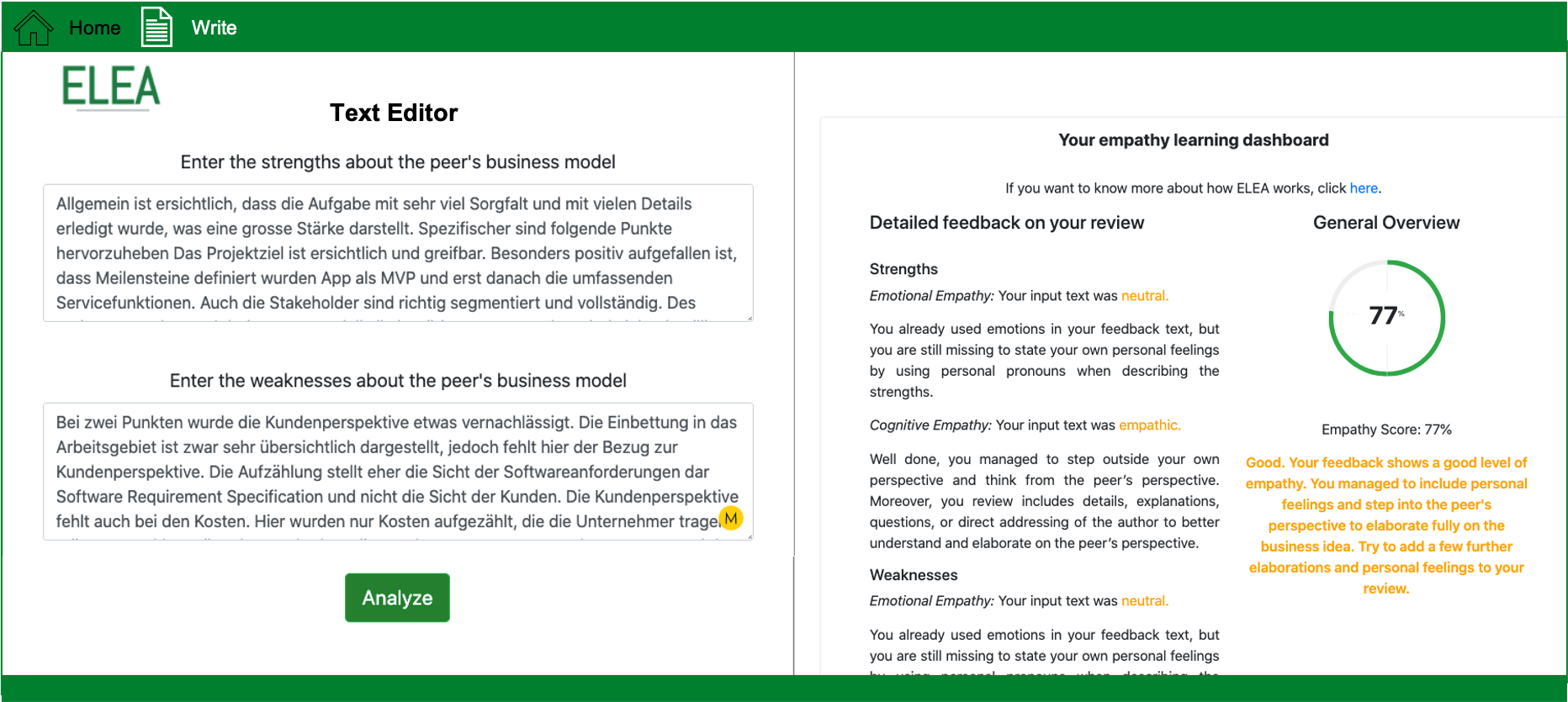 |
Elea - an empathy feedback tool an adaptive empathy writing support tool based on artificial intelligence for students to foster empathic writing independent of an instructor, time and location (Info) |
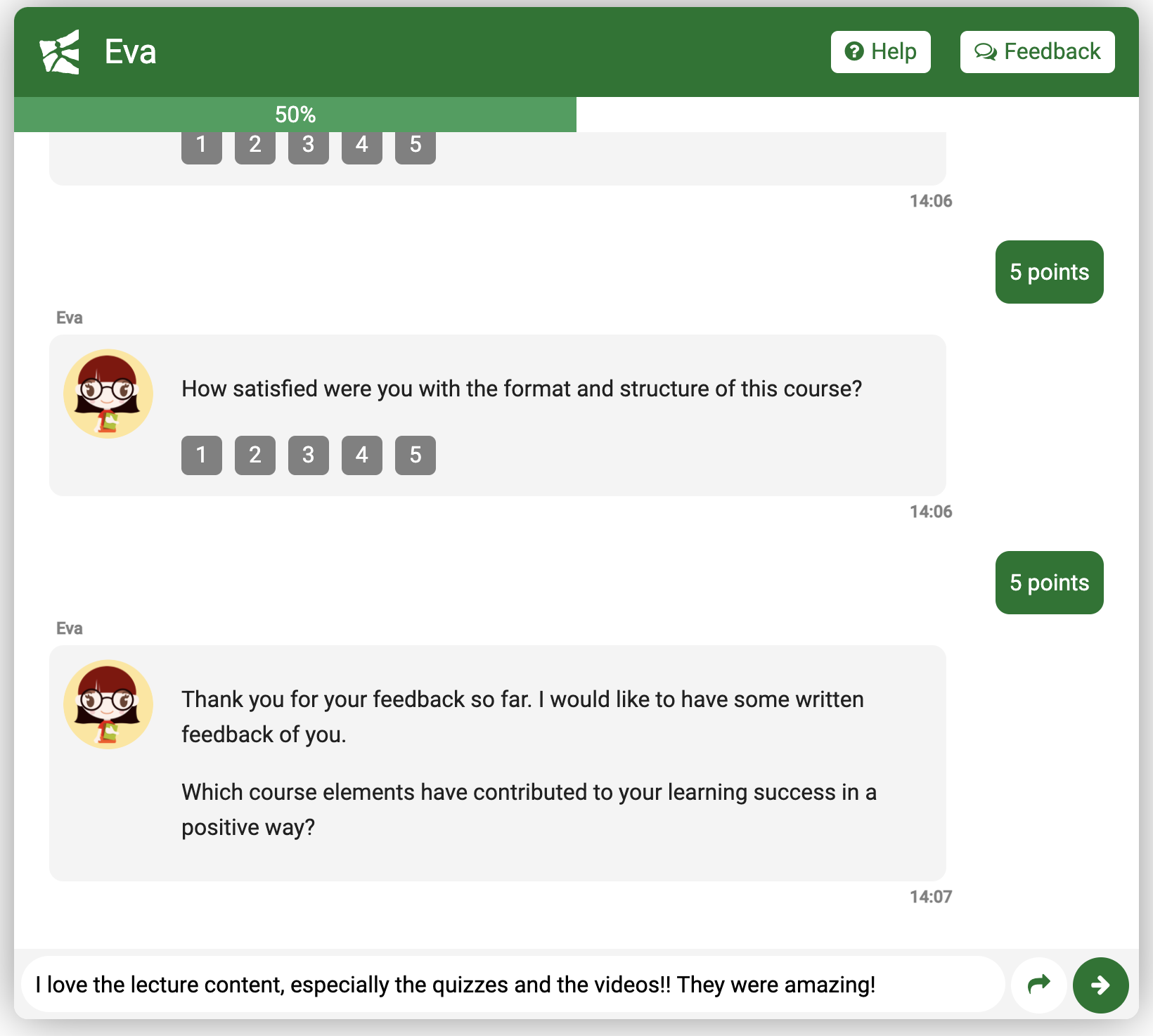 |
Eva - a course evaluation bot a chatbot for personal course evaluations in large-scale or distance-learning scenarios (Info) |
Corpora and Data Sets
In order to build HCI innovations, I collected, annotated and scientifically evaluated different corpora and data sets to train novel machine learning or deep learning models. Here is an overview of my work:
Awards and Honors
- 2025 2nd place DELINA LEARNTEC Innovation award LegalWriter – AI-based Learning Systems for legal writing skills (Info)
- 2025 Listed among the top 100 in the Wirtschaftswoche (WIWO) research ranking of all business administration and management researchers under the age of 40 in the German-speaking countries (place 53)
- 2022 Listed among the top 100 in the Wirtschaftswoche (WIWO) research ranking of all business administration and management researchers under the age of 40 in the German-speaking countries
- 2022 Best AE Award at the International Conference on Information Systems, Copenhagen, Denmark
- 2021 Nominee Best Paper Award at the International Conference on Information Systems (ICIS) Pedagogical Agents for Interactive Learning: A Taxonomy of Conversational Agents in Education (Link)
- 2021 Honourable Mention Award of the ACM Conference on Human Factors in Computing Systems (CHI) ArgueTutor: An Adaptive Dialog-Based Learning System for Argumentation Skills (Link)
- 2021 1st place DELINA LEARNTEC Innovation award ArgueLearn - Adaptive learning of argumentation skills based on artificial intelligence (Info)
- 2021 One-year research fellowship from the Swiss National Science Foundation (SNF, Doc.Mobility) at Carnegie Mellon University (Info)
- 2021 Doctoral Consortium at the ACM Conference on Human Factors in Computing Systems (CHI) Designing Adaptive Argumentation Learning Systems Based on Artificial Intelligence (Link)
- 2021 Best Reviewer Award at the International Conference on Wirtschaftsinformatik
- 2021 Nominee Best Paper Award at the International Conference on Wirtschaftsinformatik Designing an Adaptive Empathy Learning Tool Designing an Adaptive Empathy Learning Tool (Info)
- 2020 Best Reviewer Award at the International Conference on Information Systems (ICIS)
- 2020 Best Theory Paper First Runner-Up Award at the International Conference on Information Systems (ICIS) The Anatomy of User Experience with Conversational Agents: A Taxonomy and Propositions of Service Clues (Link)
- 2020 Honourable Mention Award of the ACM Conference on Human Factors in Computing Systems (CHI) AL: An Adaptive Learning Support System for Argumentation Skills (Link)
Invited Talks
- 2025 Graz University of Technology, Graz, AUT, hosted by Viktoria Pammer-Schindler.
- 2025 University of Lausanne, Lausanne, CH, hosted by Yash Raj Shrestha.
- 2024 O'Reilly Social Science Foo Camp, Meta Headquarters, Palo Alto, CA, US organized by O'Reilly, Sage and Meta.
- 2023 Eidgenössische Technische Hochschule (ETH) Zürich, CH, Language, Reasoning and Education Lab hosted by Mrinmaya Sachan (Info)
- 2022 Invited panelist at "The First Workshop on Intelligent and Interactive Writing Assistants", ACL 2022, Dublin, IRL (Info)
- 2022 University of Cambridge, UK, Natural Language and Information Processing Research Group hosted by Paula Buttery
- 2022 Data Science in Education Meetup London, UK, hosted by Aigner Picou
- 2022 German Research Center for Artificial Intelligence, GER, Educational Technology Lab hosted by Niels Pinkwart
- 2022 Ludwig Maximilian University of Munich, GER, Human Centered Ubiquitous Media hosted by Albrecht Schmidt
- 2022 University of Koblenz and Landau, GER, Institute for Education in Childhood and Adolescence hosted by Miriam Leuchter
- 2022 Karlsruhe Institute of Technology, GER, Institute of Information Systems and Marketing hosted by Alexander Mädche
- 2021 Carnegie Mellon University, US, Language Technologies Institute hosted by Carolyn Rose
- 2021 Swiss Federal Institute of Technology in Lausanne (EPFL), CH, Machine Learning for Education Laboratory hosted by Tanja Käser
- 2021 University of Michigan, US, Interactive Systems Lab and AI Lab hosted by Xu Wang and Lu Wang
- 2021 Carnegie Mellon University, US, Human-Computer Interaction Institute (HCII) hosted by Ken Koedinger